The group of German bishops, unofficially headed by Cologne’s Cardinal Woelki, who have questioned the bishops’ conference’s proposed pastoral outreach that would allow non-Catholics to receive Communion under certain circumstances – and whose position was recently confirmed and supported by the Holy See – have received further support from abroad.
In a recent interview on the occasion of the Ad Limina visit of the Nordic bishops – which I wrote about in the previous blog post – Cardinal Anders Arborelius, himself a former Lutheran and now, as a cardinal, a member of the Pontifical Council for Promoting Christian Unity, was asked about the discussion in Germany. He answered:
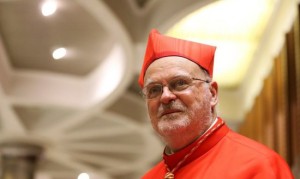 “It surprises me that the topic hasn’t been discussed that much. In Sweden, we have many mixed marriages. But most Catholics aren’t married to practicing Protestants. It is not an issue for us. Of course there are evangelical Christians who would like to receive Communion, but most are non-religious.
“It surprises me that the topic hasn’t been discussed that much. In Sweden, we have many mixed marriages. But most Catholics aren’t married to practicing Protestants. It is not an issue for us. Of course there are evangelical Christians who would like to receive Communion, but most are non-religious.
Of course, the ideal would be that the entire Church is able to arrive at a common solution, but it is difficult: in one country, the situation is thus, in the other it is different. Hopefully, we will one day be able to find a common solution with the entire Church.”
This is exactly what Cardinal Woelki has also said: it is not up to the German bishops alone to decide upon matters that are so essential to the Catholic faith and the understanding of the sacraments. Rather, the entire Church as a whole must decide upon it, if only to avoid the situation in which a regulation is valid in one place and not in another: the Church is not a national Church, but universal, and her sacraments and faith are not bound by borders.
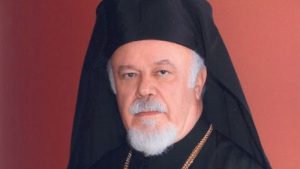 Greek-Orthodox Metropolitan Augoustinos, who hosted Cardinal Woelki in Bonn for the annual plenary meeting of the Greek-Orthodox Church in Germany, expressed himself in similar words after indicating that his church is also following the debate closely. He referred to the Orthodox principle of Oikonomia, which indicates that a regulation can be ignored or a rule broken when it serves the salvation of the person involved. But he then quoted Ecumenical Patriarch Bartholomew I, saying: “As soon as one defines the conditions under which Oikonomia can be applied, Oikonomia itself becomes a rule or regulation.”
Greek-Orthodox Metropolitan Augoustinos, who hosted Cardinal Woelki in Bonn for the annual plenary meeting of the Greek-Orthodox Church in Germany, expressed himself in similar words after indicating that his church is also following the debate closely. He referred to the Orthodox principle of Oikonomia, which indicates that a regulation can be ignored or a rule broken when it serves the salvation of the person involved. But he then quoted Ecumenical Patriarch Bartholomew I, saying: “As soon as one defines the conditions under which Oikonomia can be applied, Oikonomia itself becomes a rule or regulation.”
Cardinal Woelki has spoken about the unwritten rule that a non-Catholic presenting himself for Communion is not turned away: a pastoral exception to the rule which, however, must not be made into a rule itself. That would “endanger the values that must be preserved with special care”. These values would include the Catholic (and, for that matter, Orthodox) doctrine about the Eucharist and Communion.
In an interview for Katholisch.de, Bishop Stefan Oster of Passau also spoke about this point in the debate. He was also one of the seven signatories of the letter to Rome which questioned if the pastoral outreach did not transcend the authority of the German bishops. The bishop explains:
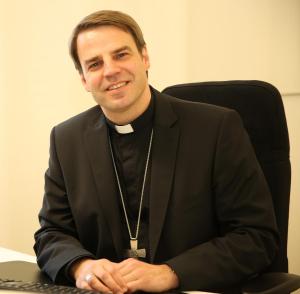 “It is right that we do not turn anyone away from the Communion bench. At that moment no judgement can be made about the discernment of conscience of the individual receiving. I can’t ‘expose’ anyone then. But when we take our understanding of the Eucharist seriously, there can be no superficial practice of giving Communion to just anyone. Therefore, as the priest giving Communion, I am obliged to offer people, at a suitable occasion, personal and spiritual guidance – and explain our understanding of the Eucharist more deeply. And yes, the praxis of individual pastoral care can indeed lead to singular and temporary situations. But in my opinion an official regulation of such exceptions can make it even more likely for such exceptions to become the rule. The current debate already shows that. It is basically less about the “serious spiritual need of individuals,” and more about the interdenominational marriages in general.”
“It is right that we do not turn anyone away from the Communion bench. At that moment no judgement can be made about the discernment of conscience of the individual receiving. I can’t ‘expose’ anyone then. But when we take our understanding of the Eucharist seriously, there can be no superficial practice of giving Communion to just anyone. Therefore, as the priest giving Communion, I am obliged to offer people, at a suitable occasion, personal and spiritual guidance – and explain our understanding of the Eucharist more deeply. And yes, the praxis of individual pastoral care can indeed lead to singular and temporary situations. But in my opinion an official regulation of such exceptions can make it even more likely for such exceptions to become the rule. The current debate already shows that. It is basically less about the “serious spiritual need of individuals,” and more about the interdenominational marriages in general.”
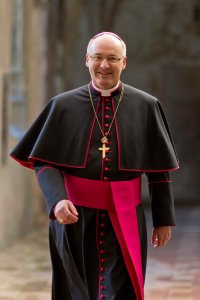
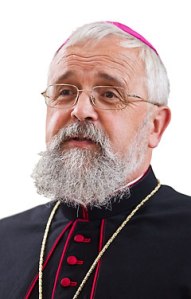 Opposing the actions of the seven bishops is Bishop Gerhard Feige, bishop of Magdeburg and president of the ecumenism commission of the German Bishops’ Conference. In a contribution to Der Zeit last Thursday, Msgr. Feige stated that not taking the chance to help people deepen the joy of the faith and their participation in the Eucharist, as well as promoting ecumenical encounters and strengthening the marriage bond would be “macabre and shameful”. Contrary to other bishops, Msgr. Feige insists that the pastoral outreach exists within modern theological and legal possibilities, referring to the canon law paragraphs which allow local bishops to decide under which circumstances non-Catholic can receive Communion. These circumstances, however, are emergency situations in which the danger of death and the unavailability of ministers of a person’s own denomination play key roles.
Opposing the actions of the seven bishops is Bishop Gerhard Feige, bishop of Magdeburg and president of the ecumenism commission of the German Bishops’ Conference. In a contribution to Der Zeit last Thursday, Msgr. Feige stated that not taking the chance to help people deepen the joy of the faith and their participation in the Eucharist, as well as promoting ecumenical encounters and strengthening the marriage bond would be “macabre and shameful”. Contrary to other bishops, Msgr. Feige insists that the pastoral outreach exists within modern theological and legal possibilities, referring to the canon law paragraphs which allow local bishops to decide under which circumstances non-Catholic can receive Communion. These circumstances, however, are emergency situations in which the danger of death and the unavailability of ministers of a person’s own denomination play key roles.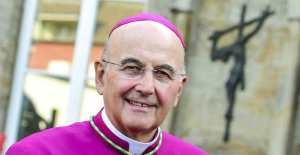 Münster’s Bishop Felix Genn is hopeful of finding a consensus. While the way in which the seven bishops expressed their difficulties with the conference’s vote did not make him happy, he understands their questions of conscience. In an interview for WDR radio Bishop Genn expressed his happiness about the way in which the standing council of the bishops’ conference discussed the issue last week. And although he would have preferred that the seven bishops had first informed the others about their letter before sending it, Bishop Genn’s attitude is perhaps the most consensus-minded in the delegation, which may be a reason for his inclusion. The bishop, for his part, simply thought of his mother’s motto when hearing about being included in the delegation: “One has never got enough work to do.”
Münster’s Bishop Felix Genn is hopeful of finding a consensus. While the way in which the seven bishops expressed their difficulties with the conference’s vote did not make him happy, he understands their questions of conscience. In an interview for WDR radio Bishop Genn expressed his happiness about the way in which the standing council of the bishops’ conference discussed the issue last week. And although he would have preferred that the seven bishops had first informed the others about their letter before sending it, Bishop Genn’s attitude is perhaps the most consensus-minded in the delegation, which may be a reason for his inclusion. The bishop, for his part, simply thought of his mother’s motto when hearing about being included in the delegation: “One has never got enough work to do.”
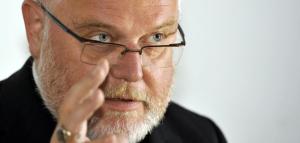 Cardinal Reinhard Marx, president of the German Bishops’ Conference, responded with a letter to all German bishops – a decision motivated by the fact that the letter concerns a decision made by the entire conference and was sent to the Holy See and the Apostolic Nuncio. In his response, he emphasises that no decision has been made to allow non-Catholics to receive Communion, but that there is a working document which may still be amended or changed. The cardinal also reminds the authors that bishops’ conferences and individual bishops have the right, according to canon law, to determine when Holy Communion can be given licitly to non-Catholics.
Cardinal Reinhard Marx, president of the German Bishops’ Conference, responded with a letter to all German bishops – a decision motivated by the fact that the letter concerns a decision made by the entire conference and was sent to the Holy See and the Apostolic Nuncio. In his response, he emphasises that no decision has been made to allow non-Catholics to receive Communion, but that there is a working document which may still be amended or changed. The cardinal also reminds the authors that bishops’ conferences and individual bishops have the right, according to canon law, to determine when Holy Communion can be given licitly to non-Catholics.
 Although not unexpected following the prayer request for his health, issued last week by Bishop Peter Kohlgraf, the death of Cardinal Karl Lehmann, early yesterday morning, is a sad conclusion to a long lifetime of service to the Church, one that coincided with and shaped the past decades of her life and development.
Although not unexpected following the prayer request for his health, issued last week by Bishop Peter Kohlgraf, the death of Cardinal Karl Lehmann, early yesterday morning, is a sad conclusion to a long lifetime of service to the Church, one that coincided with and shaped the past decades of her life and development. Among the cardinals in question are Jozef Cardinal De Kesel (at left), archbishop of Mechelen-Brussels, and Anders Cardinal Arborelius, bishop of Stockholm. They have been appointed as members of the Dicastery for the Laity, the Family and Life, and the Pontifical Council for Promoting Christian Unity, respectively.
Among the cardinals in question are Jozef Cardinal De Kesel (at left), archbishop of Mechelen-Brussels, and Anders Cardinal Arborelius, bishop of Stockholm. They have been appointed as members of the Dicastery for the Laity, the Family and Life, and the Pontifical Council for Promoting Christian Unity, respectively.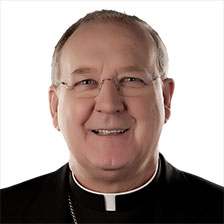 The new Dicastery for the Laity, the Family and Life is unusual in several ways. Although it succeeds two pontifical councils, it is itself not one. Neither is it that other type of curial office, a congregation. It is officially branded a dicastery, which is pretty general: both a pontifical council and a congregation are dicasteries, which is simply a term to describe a department of the curia. It is, however, to be lead by a prefect instead of a president. Prefects normally lead congregations, while presidents head pontifical councils. And prefects and presidents are usually made archbishops, but the new head of the dicastery simply remains Bishop Kevin Joseph Farrell.
The new Dicastery for the Laity, the Family and Life is unusual in several ways. Although it succeeds two pontifical councils, it is itself not one. Neither is it that other type of curial office, a congregation. It is officially branded a dicastery, which is pretty general: both a pontifical council and a congregation are dicasteries, which is simply a term to describe a department of the curia. It is, however, to be lead by a prefect instead of a president. Prefects normally lead congregations, while presidents head pontifical councils. And prefects and presidents are usually made archbishops, but the new head of the dicastery simply remains Bishop Kevin Joseph Farrell.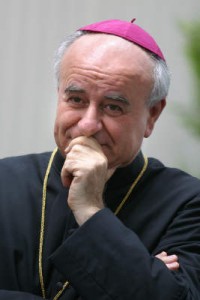 In picking the now-emeritus Bishop of Dallas, Pope Francis made a choice from outside the Roman curia. There were several options in Rome, in the first place, the heads of the suppressed pontifical councils: Cardinal Stanislaw Rylko of Laity and Archbishop Vincenzo Paglia of Family. But the former remains without a new appointment for now, while the latter moves to the third body that was expected to be merged into the new dicastery: Archbishop Paglia (at left) becomes the new president of the Pontifical Academy for Life as well as Grand Chancellor of the Pontifical Institute “John Paul II” for the study of marriage and family. Both are duties not entirely unrelated to his previous work as president of the Pontifical Academy for the Family, although they are more academical.
In picking the now-emeritus Bishop of Dallas, Pope Francis made a choice from outside the Roman curia. There were several options in Rome, in the first place, the heads of the suppressed pontifical councils: Cardinal Stanislaw Rylko of Laity and Archbishop Vincenzo Paglia of Family. But the former remains without a new appointment for now, while the latter moves to the third body that was expected to be merged into the new dicastery: Archbishop Paglia (at left) becomes the new president of the Pontifical Academy for Life as well as Grand Chancellor of the Pontifical Institute “John Paul II” for the study of marriage and family. Both are duties not entirely unrelated to his previous work as president of the Pontifical Academy for the Family, although they are more academical.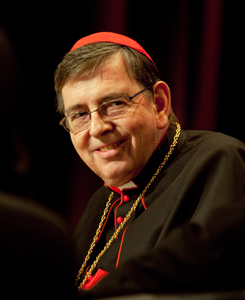 “I wonder if what the Pope is saying is being received. Considering the catechesis at the general audiences, which are, by the way, in fundamental continuity with the magisterium of Pope Benedict XVI, and in which he strongly emphasises the Church’s motherhood and the fundamental meaning of the sacraments, especially Confession, I sometimes wonder if it is really being heard or if, in some sense, it is only being noticed how it is being conveyed. This one-sided perception can then give the false impression that the Church is being newly created here.”
“I wonder if what the Pope is saying is being received. Considering the catechesis at the general audiences, which are, by the way, in fundamental continuity with the magisterium of Pope Benedict XVI, and in which he strongly emphasises the Church’s motherhood and the fundamental meaning of the sacraments, especially Confession, I sometimes wonder if it is really being heard or if, in some sense, it is only being noticed how it is being conveyed. This one-sided perception can then give the false impression that the Church is being newly created here.”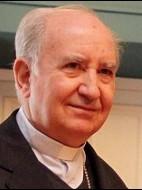 5 September: Francisco Javier Cardinal Errázuriz Ossa turns 80. One of the members of Pope Francis’ advisory council, Cardinal Errázuriz is by no means retired. A priest of the Institute of Schönstatt Fathers, he was Secretary of the Congregation for Institutes of Consecrated Life and Societies of Apostolic Life from 1990 to 1996. Retaining his title of Archbishop, he became Bishop of Valparaíso in Chile in 1996 before moving on the nation’s premier see of Santiago in 1998. Blessed Pope John Paul II made him Cardinal-Priest of Santa Maria della Pace in 2001. Cardinal Errázuriz retired in 2010.
5 September: Francisco Javier Cardinal Errázuriz Ossa turns 80. One of the members of Pope Francis’ advisory council, Cardinal Errázuriz is by no means retired. A priest of the Institute of Schönstatt Fathers, he was Secretary of the Congregation for Institutes of Consecrated Life and Societies of Apostolic Life from 1990 to 1996. Retaining his title of Archbishop, he became Bishop of Valparaíso in Chile in 1996 before moving on the nation’s premier see of Santiago in 1998. Blessed Pope John Paul II made him Cardinal-Priest of Santa Maria della Pace in 2001. Cardinal Errázuriz retired in 2010.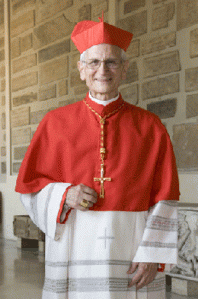 24 September: Raffaele Cardinal Farina turns 80. The scholar-cardinal has performed a whole raft of functions, starting in 1977 as the Rector Magnificus of the Pontifical Salesian University, an office he held until 1983. From 1981 to 1989 he was Secretary of the Pontifical Committee of Historical Sciences and from 1986 to 1991 Undersecretary of the Pontifical Council for Culture.He completed a second term as Rector Magnificus of the Salesian from 1991 to 1997. From 1997 to 2007 he was Prefect of the Vatican Apostolic Library. Made a Bishop in 2006 and an Archbishop in 2007, he was Archivist of the Vatican Secret Archives and Librarian of the Vatican Apostolic Library from 2007 to 2012. Pope Benedict XVI made him Cardinal-Deacon of San Giovanni della Pigna in 2007. Since June of this year, Cardinal Farina is President of the Pontifical Commission for Reference on the Institute for Works of Religion, which oversees the Vatican Bank. With the 80th birthdays of Cardinals Errázuriz and Farina, the number of electors stands at 110 out of 201 living cardinals.
24 September: Raffaele Cardinal Farina turns 80. The scholar-cardinal has performed a whole raft of functions, starting in 1977 as the Rector Magnificus of the Pontifical Salesian University, an office he held until 1983. From 1981 to 1989 he was Secretary of the Pontifical Committee of Historical Sciences and from 1986 to 1991 Undersecretary of the Pontifical Council for Culture.He completed a second term as Rector Magnificus of the Salesian from 1991 to 1997. From 1997 to 2007 he was Prefect of the Vatican Apostolic Library. Made a Bishop in 2006 and an Archbishop in 2007, he was Archivist of the Vatican Secret Archives and Librarian of the Vatican Apostolic Library from 2007 to 2012. Pope Benedict XVI made him Cardinal-Deacon of San Giovanni della Pigna in 2007. Since June of this year, Cardinal Farina is President of the Pontifical Commission for Reference on the Institute for Works of Religion, which oversees the Vatican Bank. With the 80th birthdays of Cardinals Errázuriz and Farina, the number of electors stands at 110 out of 201 living cardinals.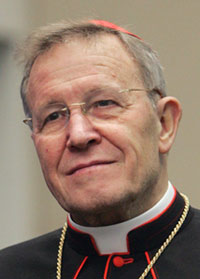 Whereas a cardinal’s 80th birthday usually represent a pretty definite point beyond which he can no longer vote in a conclave, this is not so for Walter Cardinal Kasper. His 80th birthday, yesterday, fell in the sede vacante, and that means that he can still vote in the upcoming conclave. Only cardinals who mark their 80th before the See of Peter falls vacant lose that right.
Whereas a cardinal’s 80th birthday usually represent a pretty definite point beyond which he can no longer vote in a conclave, this is not so for Walter Cardinal Kasper. His 80th birthday, yesterday, fell in the sede vacante, and that means that he can still vote in the upcoming conclave. Only cardinals who mark their 80th before the See of Peter falls vacant lose that right.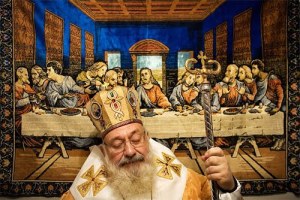 In the last such event before the sede vacante begins, Ukrainian Lubomyr Cardinal Husar marks his 80th birthday today, and as such can not take part in the conclave.
In the last such event before the sede vacante begins, Ukrainian Lubomyr Cardinal Husar marks his 80th birthday today, and as such can not take part in the conclave.